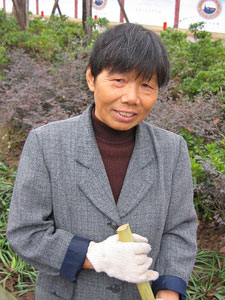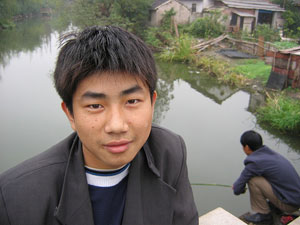HSBC Champions: Golf still an elitist pursuit in China
This story originally appeared on ESPN.com.
 by DAN WASHBURN
by DAN WASHBURN
Sheshan International Golf Club, site of this week’s HSBC Champions tournament, is about an hour west of Shanghai — if you are lucky. The only way to get there from downtown is a start-and-stop ride along the Hu Ning “Expressway,” an overcrowded stretch of asphalt that cuts through a grim part of the city you won’t find mentioned in any tour book. Most spectators are bussed in and bussed out and never set foot outside the picturesque private grounds. And if you were part of that crowd on Thursday and Friday, it would be easy to draw this conclusion: China loves Tiger Woods.
In a nation of 1.3 billion, crowds are not hard to come by. But on a golf course? That’s something new in a country with only an estimated 200,000 people who play the sport, a country that didn’t have a golf course until 1984. The gallery following Woods for the tournament’s first two rounds easily topped 1,000. Some guessed it was closer to 2,000. That’s more than four times the number of fans who followed Ernie Els during the final round of the BMW Asian Open here in May.
“I’m not surprised at all,” said Guan Han Wen, of Guangzhou in southern China, who thought nothing of dropping a couple thousand dollars to fly to Shanghai, along with his wife and son, to see Tiger play. An interior designer, Guan started golfing six years ago, and his 7-year-old son, Guan Tian Lang, took up the sport at the age of four. In July, Tian Lang placed fourth in the 6-and-under division at the Junior Golf Championships in San Diego.
The elder Guan estimated that half of the Chinese who showed up for the HSBC Champions tournament were true fans of golf like himself. And the rest? “They’re just after the fame of Tiger,” he said. “He’s the king.”
Indeed. Thursday’s issue of major Shanghai newspaper Xinmin Evening News ran a story about a local businessman named Zhang Hong Wei who was so excited when he found out Woods was going to play in Shanghai that he “couldn’t sleep for one whole night.” The adoration didn’t only come from fans, either. On Thursday, during a post-round press conference where he also spoke at length about getting dumped by his girlfriend, 23-year-old Englishman Nick Dougherty said, “I idolize Tiger Woods.” China’s top golfer Zhang Lian Wei, who named his son Tiger, said Woods’ presence at the tournament “moved China golf forward by 10 years.”
 But all anyone had to do was set foot outside the vacuum of Sheshan International Golf Club to realize that even with a 10 year leap, golf in China has a long way to go before it catches on with the masses — most of whom, believe it or not, have never heard the name “Tiger Woods” before.
But all anyone had to do was set foot outside the vacuum of Sheshan International Golf Club to realize that even with a 10 year leap, golf in China has a long way to go before it catches on with the masses — most of whom, believe it or not, have never heard the name “Tiger Woods” before.
“Who?” asked Yao Guang Mei, taking a break from sweeping leaves with a bamboo broom just inside the club entrance. “No, I don’t know that person. All I know is that foreigners will come here to compete.”
Yao, who lives in a village 30 minutes away from the course, gets paid five dollars a day to work at the club, where a lifetime membership costs $148,000 and furnished villas average $2 million. She’s happy to have the job.
“It looks great,” she said of the grounds. “But all of these big houses look the same. Sometimes I get lost.” Yao stopped to laugh before adding, “Back home, I don’t get to see much of this modern society. When I got the chance to work here, I was very excited to see all of these new things.”
Golf, like luxury cars and Luis Vuitton, is now a way for China’s recently rich to enjoy — and project — their newfound affluence. It is also a stark reminder of the huge gap that exists between the haves and have-nots here. Since courses are often built in poor, rural areas, luxury homes can sit across a creek from shantytowns. Two very different worlds collide, and golf maintains its reputation as an elitist sport.
Not too long ago, the site of the HSBC Champions tournament was home to rice paddies, a stone factory and a village full of people. The villagers were relocated and the factory was leveled. Last fall, “Shanghai’s first truly private and exclusive ‘members only’ golf club” — as Sheshan’s website puts it — opened in their place. Such transformations are happening throughout suburban Shanghai as developers of luxury communities snatch up the land. Not too far from Sheshan is a mini-city called Thames Town and another named Santa Luz, boasting “original Southern California villas.”
 In keeping with the theme, tournament passes for the HSBC Champions tournament cost roughly $250. That’s more than the average Shanghainese family makes in a month.
In keeping with the theme, tournament passes for the HSBC Champions tournament cost roughly $250. That’s more than the average Shanghainese family makes in a month.
“Poor people are the majority in China – they can’t be interested in a game they can’t afford,” said a man surnamed Gu, who is paid $2.50 a day to direct traffic outside the tournament. “Maybe there are people who are interested, but to me, I’m only making 950 yuan ($118) a month. There’s no way I can even afford a ticket.”
Had Gu ever hear of Tiger Woods? “No, sorry,” he apologized. “This is my first day.”
A couple hundred meters beyond Gu, not too far from one of the parking lots for the tournament, 20-year old Yang Gui Lin sat on a small bridge and fished with a bamboo pole. On the left bank of the creek was a new housing development with spacious homes and security cameras every 10 feet or so. The cameras were pointed toward Yang’s village — a shack, some vegetable gardens and a cluster of graying cement buildings.
Yang, a migrant worker from faraway Sichuan province, normally would have been working at a nearby door and window factory, but he and all his coworkers were given two weeks off — unpaid — because of the golf tournament.
 “I don’t know why,” Yang said. “Maybe they think we would disturb the people playing. The factory can be loud.”
“I don’t know why,” Yang said. “Maybe they think we would disturb the people playing. The factory can be loud.”
Yang said he had seen golf on television before — although he, too, had never heard of a guy name Tiger Woods — and admitted being a little intrigued by the game. “Of course it looks interesting,” he said. “But so what? I’m never going to play it anyways. Only rich people can play golf.”
Then, 78-year-old fruit salesman Chen Zi Xue pedaled his wagon by. He had always assumed that only foreigners played golf.
“Of course I don’t know anything about golf,” he said. “I don’t speak their language. If I understood them, I wouldn’t be here selling fruit.”
